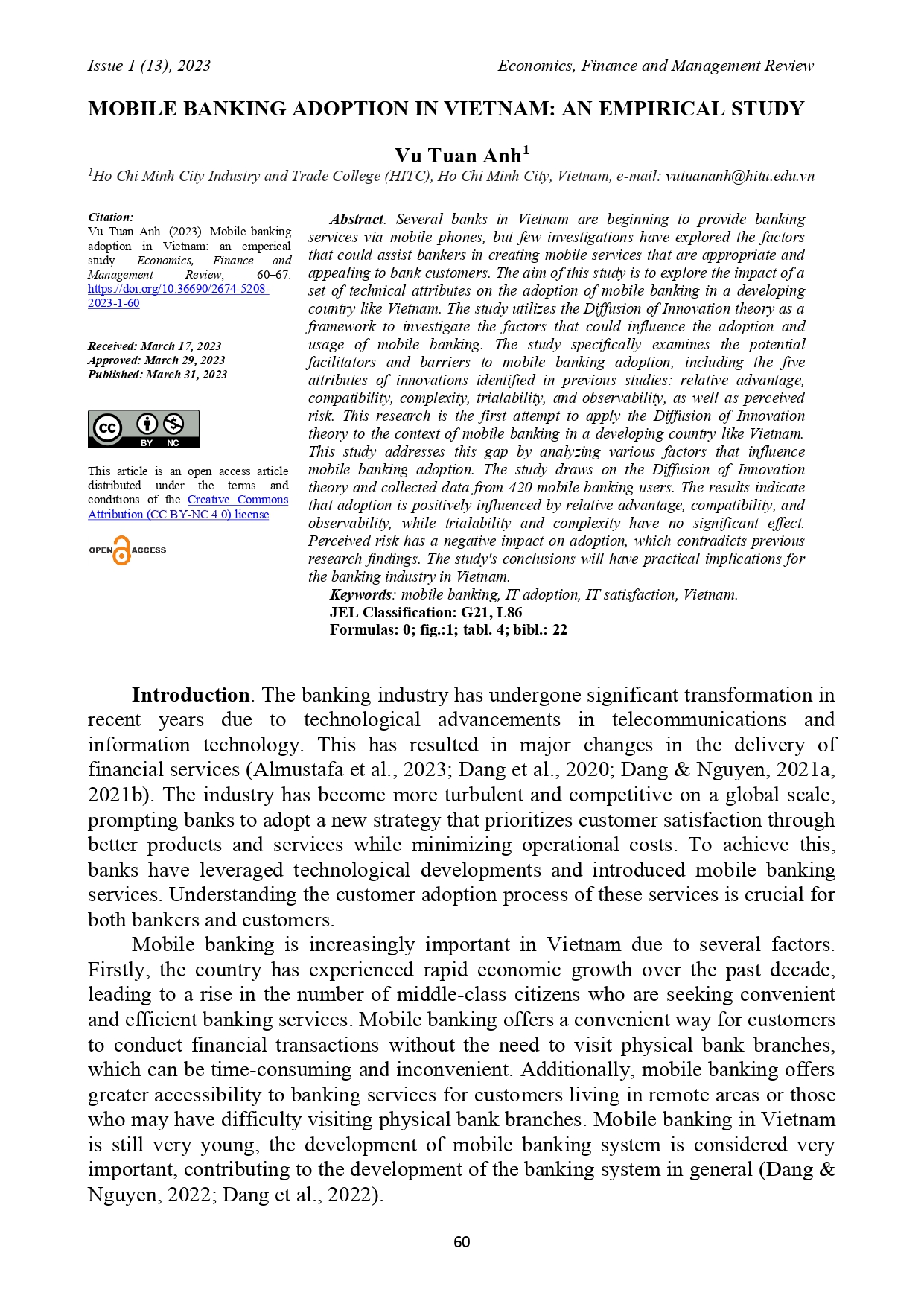MOBILE BANKING ADOPTION IN VIETNAM: AN EMPERICAL STUDY
DOI:
https://doi.org/10.36690/2674-5208-2023-1-60Keywords:
mobile banking, IT adoption, IT satisfaction, VietnamAbstract
Several banks in Vietnam are beginning to provide banking services via mobile phones, but few investigations have explored the factors that could assist bankers in creating mobile services that are appropriate and appealing to bank customers. The aim of this study is to explore the impact of a set of technical attributes on the adoption of mobile banking in a developing country like Vietnam. The study utilizes the Diffusion of Innovation theory as a framework to investigate the factors that could influence the adoption and usage of mobile banking. The study specifically examines the potential facilitators and barriers to mobile banking adoption, including the five attributes of innovations identified in previous studies: relative advantage, compatibility, complexity, trialability, and observability, as well as perceived risk. This research is the first attempt to apply the Diffusion of Innovation theory to the context of mobile banking in a developing country like Vietnam. This study addresses this gap by analyzing various factors that influence mobile banking adoption. The study draws on the Diffusion of Innovation theory and collected data from 420 mobile banking users. The results indicate that adoption is positively influenced by relative advantage, compatibility, and observability, while trialability and complexity have no significant effect. Perceived risk has a negative impact on adoption, which contradicts previous research findings. The study's conclusions will have practical implications for the banking industry in Vietnam.
Downloads
References
Almustafa, H., Nguyen, Q. K., Liu, J., & Dang, V. C. (2023). The impact of COVID-19 on firm risk and performance in MENA countries: Does national governance quality matter? PloS one, 18(2), e0281148.
Chen, L., “A model of consumer acceptance of mobile payment,” International Journal of Mobile Communications, Vol. 6, No. 1: 32-52, 2008.
Dang, V. C., & Nguyen, Q. K. (2021a). Determinants of FDI attractiveness: Evidence from ASEAN-7 countries. Cogent Social Sciences, 7(1), 2004676.
Dang, V. C., & Nguyen, Q. K. (2021b). Internal corporate governance and stock price crash risk: evidence from Vietnam. Journal of Sustainable Finance & Investment, 1-18. doi:10.1080/20430795.2021.2006128
Dang, V. C., & Nguyen, Q. K. (2022). Audit committee characteristics and tax avoidance: Evidence from an emerging economy. Cogent Economics & Finance, 10(1), 2023263.
Dang, V. C., Le, T. L., Nguyen, Q. K., & Tran, D. Q. (2020). Linkage between exchange rate and stock prices: Evidence from Vietnam. The Journal of Asian Finance, Economics, and Business, 7(12), 95-107.
Dang, V. C., Nguyen, Q. K., & Tran, X. H. (2022). Corruption, institutional quality and shadow economy in Asian countries. Applied Economics Letters, 1-6.
Delone, W. and E. McLean, “Information systems success: the quest for the dependent variable,” Information Systems Research, Vol. 3, No. 1: 60-95, 1992.
DeLone, W. and E. McLean, “The DeLone and McLean Model of Information Systems Success: A Ten-Year Update”, Journal of Management Information Systems, Vol. 19, No. 4: 9–30, 2003.
Gu, J-C., S-C. Lee, and Y-H. Suh, “Determinants of behavioral intention to mobile banking,” Expert Systems with Applications, Vol. 36, No. 9: 11605-11616, 2009.
Koenig-Lewis, N., A. Palmer, and A. Moll, “Predicting young consumers’ take up of mobile banking services,” International Journal of Bank Marketing, Vol. 28, No. 5: 410-432, 2010.
Moore, G. C. and I. Benbasat, “Development of an instrument to measure the perceptions of adopting an information technology innovation,” Information Systems Research, Vol. 2, No. 3: 192-222, 1991.
Nguyen, Q. K. (2020). Ownership structure and bank risk-taking in ASEAN countries: A quantile regression approach. Cogent Economics & Finance, 8(1), 1809789.
Nguyen, Q. K. (2021). Oversight of bank risk-taking by audit committees and Sharia committees: conventional vs Islamic banks. Heliyon, 7(8), e07798.
Nguyen, Q. K. (2022a). Audit committee effectiveness, bank efficiency and risk-taking: Evidence in ASEAN countries. Cogent Business & Management, 9(1), 2080622.
Nguyen, Q. K. (2022b). Audit committee structure, institutional quality, and bank stability: evidence from ASEAN countries. Finance Research Letters, 46, 102369.
Nguyen, Q. K. (2022c). Determinants of bank risk governance structure: A cross-country analysis. Research in International Business and Finance, 60, 101575. doi:https://doi.org/10.1016/j.ribaf.2021.101575
Nguyen, Q. K. (2022d). The Effect of FinTech Development on Financial Stability in an Emerging Market: The Role of Market Discipline. Research in Globalization, 100105.
Nguyen, Q. K. (2022e). The impact of risk governance structure on bank risk management effectiveness: evidence from ASEAN countries. Heliyon, e11192.
Nguyen, Q. K., & Dang, V. C. (2022). Does the country’s institutional quality enhance the role of risk governance in preventing bank risk? Applied Economics Letters, 1-4.
Nguyen, Q., & Dang, V. (2020). Audit committee structure and bank stability in Vietnam. ACRN Journal of Finance and Risk Perspectives, 8(1), 240-255.
Rogers, E., Diffusion of Innovations, New York, Free Press, 2003.

Downloads
Published
How to Cite
Issue
Section
License

This work is licensed under a Creative Commons Attribution-NonCommercial 4.0 International License.








